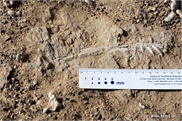Research tracks how pterosaurs mastered the primeval skies
Research tracks how pterosaurs ruled skies
By the time they were wiped out alongside their dinosaur cousins, most winged pterosaurs had evolved from awkwardly airborne to lords of the primeval skies, according to new research published on Wednesday.

Paleontologists are still piecing together details of the lives of these winged reptiles - neither dinosaurs nor birds - which soared above T-Rex, Triceratops and other dinosaurs of the late Cretaceous period.
In one of two studies published in Nature on pterosaurs, researchers in Britain found the creatures were initially ungainly fliers. But the study, which used statistical methods, biophysical models and fossil records, said that pterosaurs spent 150 million years perfecting their flying skills.
"Pterosaurs really were incredible animals," coauthor Joanna Baker of Reading University told AFP, adding that by the end they could likely have traveled "incredible distances."
"As pterosaurs became more efficient at flight, they could soar for longer and longer distances before they would need to land," she said.
Scientists have identified dozens of species of pterosaur scattered across the planet. They range from creatures barely bigger than a sparrow, to giants as tall as a giraffe and with the wingspan of a fighter jet. They were wiped out with the dinosaurs.

A giant pterodactyl with a wingspan similar to an F-16 fighter jet soared above North Africa 66 million years ago, say scientists. Photo: VCG
Paleontologists are still piecing together details of the lives of these winged reptiles - neither dinosaurs nor birds - which soared above T-Rex, Triceratops and other dinosaurs of the late Cretaceous period.
In one of two studies published in Nature on pterosaurs, researchers in Britain found the creatures were initially ungainly fliers. But the study, which used statistical methods, biophysical models and fossil records, said that pterosaurs spent 150 million years perfecting their flying skills.
"Pterosaurs really were incredible animals," coauthor Joanna Baker of Reading University told AFP, adding that by the end they could likely have traveled "incredible distances."
"As pterosaurs became more efficient at flight, they could soar for longer and longer distances before they would need to land," she said.
Scientists have identified dozens of species of pterosaur scattered across the planet. They range from creatures barely bigger than a sparrow, to giants as tall as a giraffe and with the wingspan of a fighter jet. They were wiped out with the dinosaurs.

